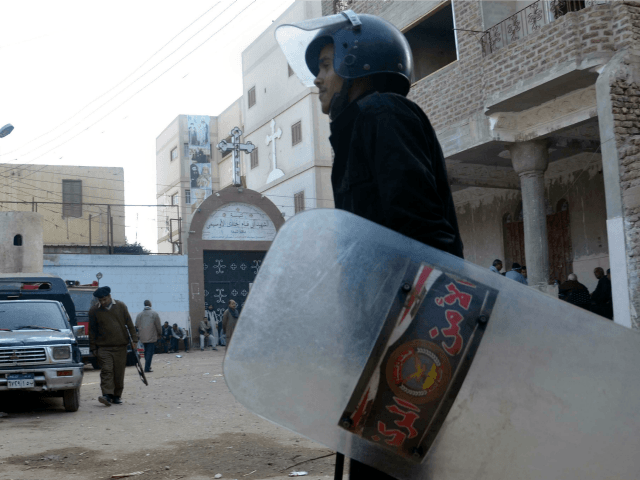CAIRO (AP) — Outside of Cairo’s St. Mark’s Cathedral, the seat of the Coptic Orthodox Pope, a dozen high-ranking police officers are stationed on all entrances, searching cars and scanning the area, as security measures are visibly beefed up outside churches before Easter prayers on Sunday.
The usually festive occasion is tainted with fearful apprehension after twin bombings in the cities of Tanta and Alexandria killed 45 people this week at churches on Palm Sunday, which marks the start of the Coptic Christian Holy Week.
The increased security measures on display outside churches across the country are meant to restore a sense of security for Egypt’s Copts amid a war on the embattled minority declared by the Islamist State group, which claimed Sunday’s bombings. However, the enhanced security can do little against the effect of repeated attacks on Coptic churches in recent years.
“No security measure can stop a suicide bomber with jihadist beliefs from blowing up a church,” Coptic engineer Emad Thomas told The Associated Press on Wednesday. However, he believes that Copts will still attend prayers on Sunday as they have continued to go to church despite earlier attacks. “Egypt’s Copts put their trust in God and not in security measures,” he said.
Egypt’s Ministry of Interior announced on Wednesday the identity of the Alexandria church bomber, saying that he belongs to the same terrorist cell that carried out the December bombing of a chapel adjacent to Egypt’s main cathedral. The ministry identified the suicide bomber as Mahmoud Hassan Mubarak Abdallah, a 30-year-old worker at a petroleum company, and published his picture. It also published names and pictures of others identified as fugitive members of the same cell, offering LE100 thousand ($5,510) for leads on their whereabouts. The Health Ministry said six Muslims were among the dead in Alexandria.
Outside of St. Joseph Roman Catholic Church in Cairo’s central downtown area, a military tank is stationed with five soldiers on top — one of the more overt manifestations of President Abdel Fattah El-Sissi’s declaration of a three-month state of emergency.
In the southern city of Assiut, security barriers closed off an area of about 100-meters around large churches. A local security source told the AP that agents will be dispersed ahead of Sunday’s prayers and a special unit will be formed at the security directorate to receive reports about suspicious individuals in the vicinity of churches. A military source said that troops have started patrolling the city and will be stationed across town before Sunday. Both officials spoke on condition of anonymity as they were not authorized to brief the media.
In the neighboring city of Minya, home to the highest Coptic Christian population in the country, the Coptic Orthodox Diocese said that celebrations will only be limited to the liturgical prayers “without any festive manifestations,” in mourning for Sunday’s victims.
Peter Naggar, a Coptic lawyer, saw the enhanced security around churches as an effort to appease Copts, many of whom blame the state for failing to protect them. In the Tanta attack, the bomber was able to enter the church and reach the front rows before blowing himself up.
“The government should have taken these measures before the Coptic celebrations season and not after disaster struck,” he said.
After claiming the December church bombing that killed 25 worshippers, the Islamic State group vowed in a statement circulated online to continue its war on Egypt’s Copts.
The group continues to target security in the Sinai Peninsula almost daily while carrying out sporadic operations in mainland Egypt. According to SITE Intelligence Group, which tracks online activity of militants, the IS-affiliated Amaq news agency announced on Tuesday that the group has killed 172 soldiers in Sinai since the beginning of the year.
The latest church bombings deal another blow to Egypt’s struggling tourism industry, which has suffered from political instability and a fragile security situation since the 2011 uprising. The U.S. issued a travel warning on Wednesday, advising its nationals in Egypt to stay away from places of worship for the next two weeks and to avoid crowds as long as they remain in the country.

COMMENTS
Please let us know if you're having issues with commenting.